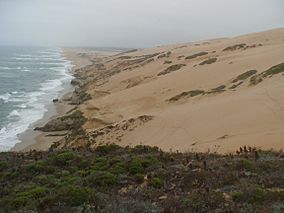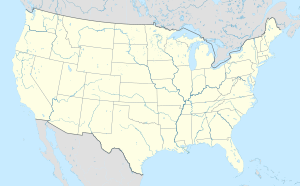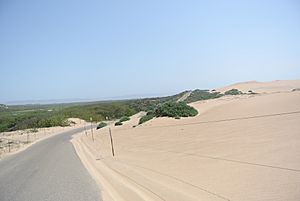Guadalupe-Nipomo Dunes National Wildlife Refuge facts for kids
Quick facts for kids Guadalupe-Nipomo Dunes National Wildlife Refuge |
|
|---|---|
|
IUCN Category IV (Habitat/Species Management Area)
|
|

|
|
| Location | San Luis Obispo County, Santa Barbara County, California, United States |
| Nearest city | Guadalupe, California |
| Area | 2,553 acres (10.33 km2) |
| Established | 2000 |
| Governing body | U.S. Fish and Wildlife Service |
| Website | Guadalupe-Nipomo Dunes National Wildlife Refuge |
The Guadalupe-Nipomo Dunes National Wildlife Refuge is a special protected area in California. It covers about 2,553 acres (10.33 square kilometers) along the state's Central Coast. This refuge is located in both San Luis Obispo and Santa Barbara Counties. It's a very important place for many plants and animals.
Contents
Where is This Special Place?
This wildlife refuge is found right next to the Pacific Ocean on its western side. Farmland borders it to the east. It's part of one of the biggest coastal dune systems left in California.
The refuge is a key part of the larger Guadalupe-Nipomo Dunes area. Many groups, including the government and private landowners, work together to protect this unique habitat. They share resources to manage the coastal environment. This teamwork helps them reach common goals, like protecting rare animals and removing plants that don't belong there.
Visiting the Dunes
You can visit parts of the Guadalupe-Nipomo Dunes through nearby State and County parks. The refuge itself offers a special wilderness experience. It's a chance to see nature up close in a way you might not find elsewhere in the dunes.
Protecting Animals and Plants
The main reason this wildlife refuge was created was to protect certain animals. It's a safe breeding ground for the California least tern, which is an endangered species. It also protects the Western snowy plover, a threatened species. These birds need quiet, undisturbed places to lay their eggs and raise their young.
Home to Rare Species
The refuge also has a special type of habitat called Coastal sage scrub. This area is home to other rare and endangered species. These include:
- The California tiger salamander
- The California red-legged frog
- The Morro blue butterfly
- The Morro shoulderband dune snail (Helminthoglypta walkeriana), which is critically endangered.
Besides animals, the refuge protects 16 different types of rare or endangered plants.
Animals Making a Comeback
Some endangered species are starting to recover thanks to places like this refuge. You might see large groups of brown pelicans flying overhead. A pair of peregrine falcons, known for their incredible speed, also live here.
The refuge is also home to many healthy populations of larger animals. These include mule deer, bobcats, and even mountain lions. In the winter, many different kinds of shore birds and waterfowl visit the refuge. They come here to find food and shelter.
 | Aaron Henry |
 | T. R. M. Howard |
 | Jesse Jackson |



